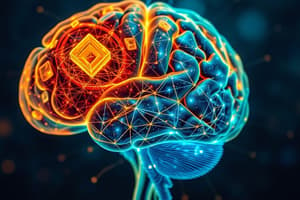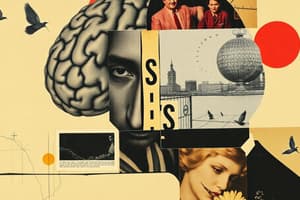Podcast
Questions and Answers
Which of the following best describes Alfred Binet's view of intelligence?
Which of the following best describes Alfred Binet's view of intelligence?
- The ability to adapt to a changing world and motivate oneself to accomplish tasks.
- The ability to do abstract thinking.
- Performance on various tasks, measured by responses to a sample of those tasks, emphasizing judgment, understanding, and reasoning. (correct)
- The aggregate capacity to act purposefully, think rationally, and deal effectively with the environment.
Lewis Terman's definition of intelligence as 'the ability to do abstract thinking' was widely accepted as a comprehensive and all-encompassing definition that included practical problem-solving and motivation.
Lewis Terman's definition of intelligence as 'the ability to do abstract thinking' was widely accepted as a comprehensive and all-encompassing definition that included practical problem-solving and motivation.
False (B)
According to David Wechsler, what three key abilities constitute intelligence?
According to David Wechsler, what three key abilities constitute intelligence?
To act purposefully, to think rationally, and to deal effectively with the environment.
Robert Sternberg believed that while traditional intelligence tests were good at assessing learning ability and abstract reasoning, there needed to be better measures for practical problem-solving and ________.
Robert Sternberg believed that while traditional intelligence tests were good at assessing learning ability and abstract reasoning, there needed to be better measures for practical problem-solving and ________.
Match the following types of intelligence, according to Edward Lee Thorndike, with their corresponding descriptions:
Match the following types of intelligence, according to Edward Lee Thorndike, with their corresponding descriptions:
Edward Lee Thorndike emphasized which two aspects in the measurement of intelligence?
Edward Lee Thorndike emphasized which two aspects in the measurement of intelligence?
Binet's intelligence tests were initially designed to identify gifted children in the school system.
Binet's intelligence tests were initially designed to identify gifted children in the school system.
Which definition of intelligence places the greatest emphasis on adapting to a changing world?
Which definition of intelligence places the greatest emphasis on adapting to a changing world?
What is a major criticism of Alfred Binet's early intelligence tests?
What is a major criticism of Alfred Binet's early intelligence tests?
According to Thorndike, acting intelligently requires the ability to recall numerous items and have a ________ memory.
According to Thorndike, acting intelligently requires the ability to recall numerous items and have a ________ memory.
Which of the following best explains why intellectually active individuals tend to show less decline on intelligence tests during adulthood?
Which of the following best explains why intellectually active individuals tend to show less decline on intelligence tests during adulthood?
Terminal drop refers to a sudden increase in cognitive functioning observed in the last few months of life.
Terminal drop refers to a sudden increase in cognitive functioning observed in the last few months of life.
How does family size typically correlate with intellectual ability, according to the information provided?
How does family size typically correlate with intellectual ability, according to the information provided?
According to Cooley's looking glass theory, people adapt their behavior based on how they believe they are ______ by others.
According to Cooley's looking glass theory, people adapt their behavior based on how they believe they are ______ by others.
Match the demographic variables with their potential influence on intellectual ability:
Match the demographic variables with their potential influence on intellectual ability:
Why might first-born children often be associated with high achievement?
Why might first-born children often be associated with high achievement?
Occupational status has no correlation with intelligence levels.
Occupational status has no correlation with intelligence levels.
Define socio-economic status (SES) as described in the content.
Define socio-economic status (SES) as described in the content.
According to the provided information, which of the following is generally true regarding sex differences in cognitive abilities?
According to the provided information, which of the following is generally true regarding sex differences in cognitive abilities?
Differences in cognitive abilities during adulthood depend on experiences relevant to ______ performance.
Differences in cognitive abilities during adulthood depend on experiences relevant to ______ performance.
Which of the following best describes the relationship between intelligence and IQ?
Which of the following best describes the relationship between intelligence and IQ?
Intelligence should be viewed as an explanatory concept, providing a comprehensive reason for individual abilities.
Intelligence should be viewed as an explanatory concept, providing a comprehensive reason for individual abilities.
How does cultural emphasis influence an individual's relative abilities over time?
How does cultural emphasis influence an individual's relative abilities over time?
IQ is both a reflection of prior educational achievement and a _________ of subsequent educational performance.
IQ is both a reflection of prior educational achievement and a _________ of subsequent educational performance.
Match the type of study with its description:
Match the type of study with its description:
In the context of age-related cognitive changes, which abilities are MORE likely to decline?
In the context of age-related cognitive changes, which abilities are MORE likely to decline?
General intelligence tests assess a single, uniform cognitive ability.
General intelligence tests assess a single, uniform cognitive ability.
Describe how intelligence test items are designed to reveal individual differences.
Describe how intelligence test items are designed to reveal individual differences.
What assumption is made about people of higher intelligence when they are exposed to common experiences?
What assumption is made about people of higher intelligence when they are exposed to common experiences?
Age related declines are associated with _____ intelligence
Age related declines are associated with _____ intelligence
Flashcards
Binet's View of Intelligence
Binet's View of Intelligence
A construct measured by performance on various tasks, emphasizing judgment, understanding, and reasoning.
Terman's Definition
Terman's Definition
The ability to do abstract thinking.
Sternberg's Intelligence
Sternberg's Intelligence
Adapting to a changing world and motivating oneself to achieve tasks.
Wechsler's Intelligence
Wechsler's Intelligence
Signup and view all the flashcards
Thorndike's Measurement
Thorndike's Measurement
Signup and view all the flashcards
Abstract or Verbal Intelligence
Abstract or Verbal Intelligence
Signup and view all the flashcards
Practical Intelligence
Practical Intelligence
Signup and view all the flashcards
Social Intelligence
Social Intelligence
Signup and view all the flashcards
Thorndike's Emphasis
Thorndike's Emphasis
Signup and view all the flashcards
Relevance of Intelligence
Relevance of Intelligence
Signup and view all the flashcards
General Mental Ability
General Mental Ability
Signup and view all the flashcards
Scholastic Aptitude
Scholastic Aptitude
Signup and view all the flashcards
Intelligence Quotient (IQ)
Intelligence Quotient (IQ)
Signup and view all the flashcards
Intelligence as Descriptive
Intelligence as Descriptive
Signup and view all the flashcards
Composite of Functions
Composite of Functions
Signup and view all the flashcards
IQ and Education
IQ and Education
Signup and view all the flashcards
Intelligence Tests Assess...
Intelligence Tests Assess...
Signup and view all the flashcards
Cross-Sectional Studies
Cross-Sectional Studies
Signup and view all the flashcards
Longitudinal Studies
Longitudinal Studies
Signup and view all the flashcards
Age-Related Cognitive Stability
Age-Related Cognitive Stability
Signup and view all the flashcards
Terminal Drop
Terminal Drop
Signup and view all the flashcards
Family Size Effect on Intelligence
Family Size Effect on Intelligence
Signup and view all the flashcards
Birth Order Effect
Birth Order Effect
Signup and view all the flashcards
Intelligence & Occupational Status
Intelligence & Occupational Status
Signup and view all the flashcards
Socio-Economic Status (SES)
Socio-Economic Status (SES)
Signup and view all the flashcards
SES & IQ Correlation
SES & IQ Correlation
Signup and view all the flashcards
Rural vs. Urban IQ
Rural vs. Urban IQ
Signup and view all the flashcards
Looking Glass Theory
Looking Glass Theory
Signup and view all the flashcards
Female Cognitive Strengths
Female Cognitive Strengths
Signup and view all the flashcards
Male Cognitive Strengths
Male Cognitive Strengths
Signup and view all the flashcards
Study Notes
Concept of Intelligence
- Intelligence is the ability to adapt to the environment, think abstractly, learn, and use memory.
- There are varying definitions of intelligence, but it is often considered a construct.
Alfred Binet's Definition
- Intelligence is seen in performance on various tasks.
- Responses to tasks can measure intelligence.
- Judgment, understanding, and reasoning are important.
- Intelligence is a behavioral attribute instead of a personal attribute.
- General intelligence appears from the sum of a person's performance.
- Binet's tests were criticized for their focus on school-type tasks, geared toward identifying mentally challenged children.
Other Views
- Lewis Terman: Intelligence involves abstract thinking, but this definition may be too narrow.
- Robert Sternberg: Intelligence is the ability to adapt to a changing world and to motivate oneself to complete tasks efficiently.
- Sternberg thought traditional tests effectively assessed learning and reasoning but lacked measures for problem-solving and motivation.
- David Wechsler: Intelligence is the global capacity to act purposefully, think rationally, and deal effectively with the environment, reflecting more than just intellectual ability.
- Edward Lee Thorndike: Intelligence measurement involves a quantitative evaluation of mental productions, judging excellence and speed.
- Acting intelligently requires recalling information and having good memory.
- Thorndike divided intelligence into verbal, practical, and social components.
- Intelligence should emphasize someone's abilities and how they use them.
- Alternate terms: general mental ability, scholastic aptitude, or academic ability.
- The latter two terms highlight the fact that tests are primarily predictors of academic success.
Intelligence Quotient
- Intelligence Quotient is shorthand for intelligence, but not specific to any test.
- Intelligence serves as a descriptive concept.
- IQ indicates one's ability level relative to age norms.
- Intelligence is a combination of functions, not just one.
- Relative abilities increase with age in culturally emphasized functions and decrease in de-emphasized ones.
- IQ reflects educational achievement and predicts future performance.
- Intelligence tests aim to gauge individual effects from shared experiences.
- It's believed that those with higher intelligence benefit more from experiences than those with lower intelligence.
Mental Ability Factors
- Mental abilities are affected by age, demographics, and biology.
Age & Intelligence
- Cross-sectional studies compare people from different environmental backgrounds.
- Longitudinal studies compare the same people at different ages.
- Intelligence tests measure a mix of cognitive abilities; performance changes with age.
- Age-related declines are less common in skills that rely on lifelong learning.
- Age-related declines are more obvious in unfamiliar logic problems or skills needing new learning.
- Declines are seen in reasoning and solving visual/geometric problems ("fluid intelligence") more than verbal skills ("crystallized intelligence").
- Cognitive abilities depend on relevant experiences.
- Intellectually active individuals decline less on intelligence tests compared to those who are not academically engaged.
- Terminal drop involves deterioration in cognitive functions, sensorimotor skills, and personality near the end of life.
- Family size and birth order affect IQ scores.
Demographic Variables
- Larger families see a decline in intellectual ability.
- First-born children are associated with high achievement and favorable parental treatment.
- More intelligent individuals enter occupations requiring more ability.
- Socio-economic status (SES) includes parental income, education, and occupation.
- Children with high IQ originate in higher social classes.
- There exists a positive correlation between IQ and socio-economic status.
- Lower IQ scores are seen in rural areas.
Urban Influences
- Urban residents often have access to superior education and technology.
- Looking Glass Theory by C.H. Cooley: adaption of behavioral and self-perceptions aligns with perceived judgements.
Biological Factors
- Sex differences include:
- Females excel in verbal fluency, reading comprehension, and clerical skills.
- Males excel in math reasoning, visual-spatial ability, speed, and coordination.
Studying That Suits You
Use AI to generate personalized quizzes and flashcards to suit your learning preferences.



